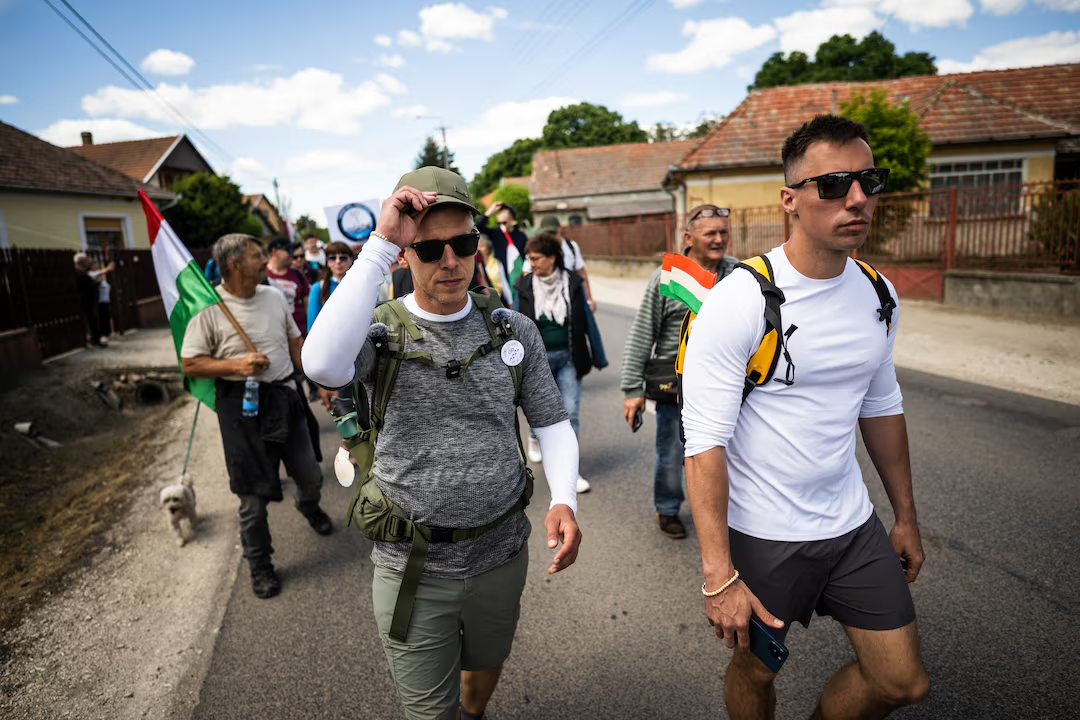Hungarian opposition leader Péter Magyar has embarked on a highly symbolic cross-border walk through parts of Romania in a bold political move to court the support of ethnic Hungarians ahead of Hungary’s 2026 parliamentary elections. His campaign highlights growing tensions over national identity and minority rights in Central and Eastern Europe.
Magyar, who heads the recently formed Respect and Freedom Party, began his walk in Transylvania—a historically contested region with a large ethnic Hungarian population—and plans to conclude in Budapest. His route passes through towns where Hungarian minorities have long expressed grievances over cultural rights and political representation.
Speaking to supporters during a stop in the Romanian town of Miercurea Ciuc, Magyar said, “I am here to show that Hungarians, regardless of borders, are one nation. We will not forget our kin who live beyond the frontier.”
Romania is home to over 1.2 million ethnic Hungarians, the largest Hungarian diaspora community in Europe. Though many hold Romanian citizenship, they retain strong cultural, linguistic, and familial ties to Hungary. Magyar’s visit, while largely ceremonial, taps into longstanding nationalist sentiments that have been central to Hungarian politics under both ruling and opposition parties.
The Hungarian government under Prime Minister Viktor Orbán has actively supported ethnic Hungarians abroad, granting them dual citizenship and voting rights. However, critics argue that this policy has been used to bolster political loyalty and sway electoral outcomes.
Magyar’s outreach signals his intention to challenge Orbán’s dominance among the diaspora. Once considered a rising star in Orbán’s Fidesz party, Magyar broke away earlier this year, citing concerns about corruption and authoritarianism. His new party positions itself as a centrist alternative that blends national pride with democratic reform.
“We need to protect our identity without turning our back on Europe,” Magyar told Reuters. “Our people in Transylvania must feel they belong to a future, not just a memory.”
Romanian officials have been cautious in their response. While Magyar’s visit does not violate any laws, it revives sensitive historical issues surrounding Transylvania, which was part of the Austro-Hungarian Empire until World War I. Romania has emphasized its commitment to minority rights, though ethnic tensions occasionally flare over language use and autonomy demands.
The ethnic Hungarian political party in Romania, the Democratic Alliance of Hungarians in Romania (UDMR), welcomed Magyar’s visit but stopped short of endorsing his campaign. “We appreciate any effort to build bridges between Hungarians across the Carpathians,” said a party spokesperson.
Analysts believe Magyar’s gesture could resonate with voters disillusioned by Orbán’s increasingly combative style, particularly among younger diaspora members who seek modernization alongside cultural preservation.
His campaign also arrives amid broader European debates over nationalism, integration, and identity politics. As Hungary gears up for the 2026 elections, observers say diaspora engagement could play a decisive role, especially in tightly contested races.
For now, Magyar’s cross-border journey remains both a political statement and a test of his ability to unify a fractured opposition. Whether it translates into electoral momentum remains uncertain, but it has undoubtedly reignited discussions about Hungary’s past—and its future.
Source: Reuters



